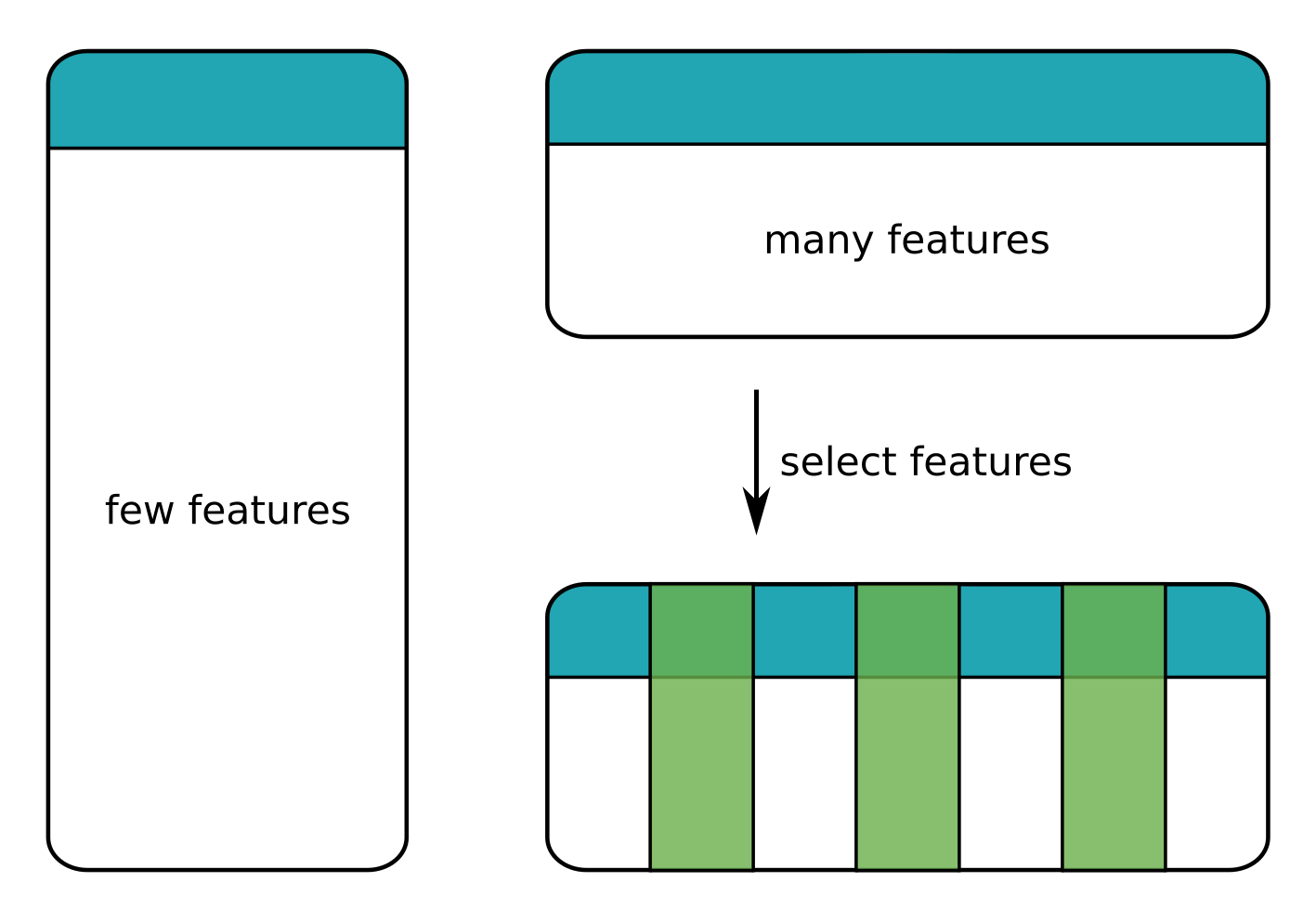Regularization
Machine Learning with PySpark

Andrew Collier
Data Scientist, Fathom Data
Features: Only a few

Features: Too many

Features: Selected

Loss function (revisited)
Linear regression aims to minimise the MSE.

Loss function with regularization
Linear regression aims to minimise the MSE.

Add a regularization term which depends on coefficients.
Regularization term
An extra regularization term is added to the loss function.
The regularization term can be either
- Lasso — absolute value of the coefficients
- Ridge — square of the coefficients
It's also possible to have a blend of Lasso and Ridge regression.
Strength of regularization determined by parameter $\lambda$:
- $\lambda = 0$ — no regularization (standard regression)
- $\lambda = \infty$ — complete regularization (all coefficients zero)
Cars again
assembler = VectorAssembler(inputCols=[
'mass', 'cyl', 'type_dummy', 'density_line', 'density_quad', 'density_cube'
], outputCol='features')
cars = assembler.transform(cars)
+-----------------------------------------------------------------------------+-----------+
|features |consumption|
+-----------------------------------------------------------------------------+-----------+
|[1451.0,6.0,1.0,0.0,0.0,0.0,0.0,303.8743455497,63.63860639785,13.32745683724]|9.05 |
|[1129.0,4.0,0.0,0.0,1.0,0.0,0.0,244.2137140385,52.82580879050,11.42673778726]|6.53 |
|[1399.0,4.0,0.0,0.0,1.0,0.0,0.0,307.6753903672,67.66557958374,14.88136784335]|7.84 |
|[1147.0,4.0,0.0,1.0,0.0,0.0,0.0,264.1031545014,60.81122599620,14.00212433714]|7.84 |
+-----------------------------------------------------------------------------+-----------+
Cars: Linear regression
Fit a (standard) Linear Regression model to the training data.
regression = LinearRegression(labelCol='consumption').fit(cars_train)
# RMSE on testing data
0.708699086182001
Examine the coefficients:
regression.coefficients
DenseVector([-0.012, 0.174, -0.897, -1.445, -0.985, -1.071, -1.335, 0.189, -0.780, 1.160])
Cars: Ridge regression
# alpha = 0 | lambda = 0.1 -> Ridge
ridge = LinearRegression(labelCol='consumption', elasticNetParam=0, regParam=0.1)
ridge.fit(cars_train)
# RMSE
0.724535609745491
# Ridge coefficients
DenseVector([ 0.001, 0.137, -0.395, -0.822, -0.450, -0.582, -0.806, 0.008, 0.029, 0.001])
# Linear Regression coefficients
DenseVector([-0.012, 0.174, -0.897, -1.445, -0.985, -1.071, -1.335, 0.189, -0.780, 1.160])
Cars: Lasso regression
# alpha = 1 | lambda = 0.1 -> Lasso
lasso = LinearRegression(labelCol='consumption', elasticNetParam=1, regParam=0.1)
lasso.fit(cars_train)
# RMSE
0.771988667026998
# Lasso coefficients
DenseVector([ 0.0, 0.0, 0.0, -0.056, 0.0, 0.0, 0.0, 0.026, 0.0, 0.0])
# Ridge coefficients
DenseVector([ 0.001, 0.137, -0.395, -0.822, -0.450, -0.582, -0.806, 0.008, 0.029, 0.001])
# Linear Regression coefficients
DenseVector([-0.012, 0.174, -0.897, -1.445, -0.985, -1.071, -1.335, 0.189, -0.780, 1.160])
Regularization → simple model
Machine Learning with PySpark

